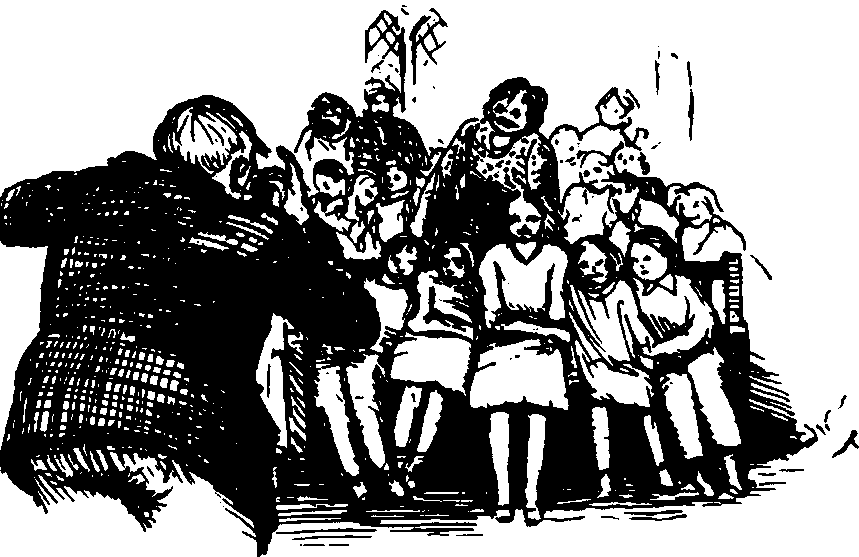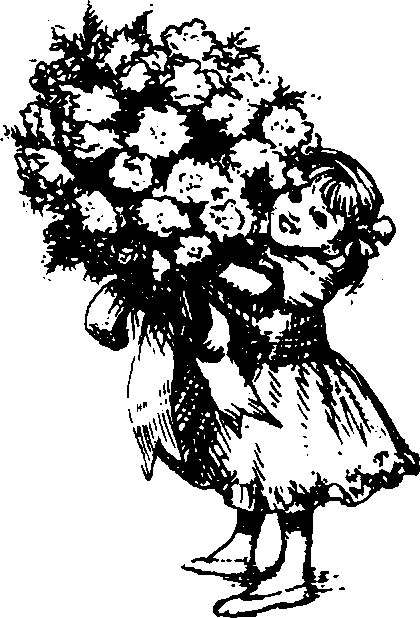Farewell to Fairacre (23 page)
Read Farewell to Fairacre Online
Authors: Miss Read
Tags: #Country Life, #Fairacre (England : Imaginary Place), #Country Life - England, #Fairacre (England: Imaginary Place)

Mr Roberts produced a length of binder twine from his pocket.
'I always carry a bit about me,' was his comment, and he went to secure the puppy and return it to the pub.
'I'm coming straight back,' he told me, 'to take your seat over to your place in the pick-up. Don't you hurry yourself. Bob's giving me a hand, and he knows just where to put it in your garden.'
'One moment,' said the vicar, 'we want a photograph of Miss Read on the seat, with all the school around her. Mr Lamb has brought his camera with him.'
We settled ourselves on my new possession. I sat in the middle and there was room for two squashed children on each side.
Mrs Richards stood behind me. While Mr Lamb fiddled importantly with the camera, she leant over and said with some agitation, 'Little Betty was supposed to be giving you a bouquet, but we dare not go into the lobby because of the dog. Can we present it after this?'
'Of course. How kind you all are!'

'Ready?' shouted Mr Lamb.
We all smiled, and John Todd held up two fingers in what I hoped was the V sign, as the camera clicked.
'Just another for good luck,' said Mr Lamb, and I was able to tell John Todd to put his hands away before the next click.
The vicar, who had been apprised of the bouquet incident, now requested everyone to wait, and the youngest child in the school emerged from the lobby carrying a bunch of flowers nearly as big as herself.
There was renewed clapping. I made a second speech of thanks, and very slowly some of the crowd began to drift homeward.
I went to collect my things from indoors. Mrs Pringle was surveying the lobby floor with a doom-laden face.
'As if it ain't bad enough with
children,
let alone
dogs'

It was a fitting farewell, I thought, as I collected my belongings.
I was home before the garden seat arrived, and was just about to put on the kettle when Amy arrived.
'I thought you might be feeling a bit low,' she said. 'It must have been a daunting day for you.'
'To be honest,' I said, 'it really hasn't sunk in yet. Such a lot happened.' I told her about the speeches and the presents and the dog and the photographs, and we agreed that a cup of tea was absolutely essential after all that.
Amy went out to her car as I set the tray, and returned with a pot containing a rose bush.
'It's one of the "Peace" variety called something like "Hope" or "Happy Future", but I seem to have lost the label.'
'It's heavenly,' I said, 'and marks the occasion perfectly.'
Mr Roberts and Bob arrived as we were pouring out, but having deposited the seat where my shabby old one once stood, they refused to join us, saying that they were now off to Springbourne to help with the cricket sight screen which was in a poor way.
'I'm not saying "goodbye",' Mr Roberts said, pecking my cheek. 'You'll be turning up in Fairacre again like a bad penny, I'll bet.'
'And I'll see you tomorrow,' added Bob, eyeing Amy's present. 'I'll put that in proper. I can see it's a beauty. I'll bring young Joe Coggs with me to hold it steady.'
We waved them goodbye, and returned to our tea cups.
'By the way,' said Amy, 'I hope you'll keep the last week of September free.'
'What's happening?'
'James is off to Florence for a conference. He'll be closeted in meetings all the time, so I hope you'll keep me company and we'll go sightseeing.'
'Perfect. But only if we go Dutch.'
'We'll see about that nearer the time,' said Amy. 'But what about the immediate future? I don't want you moping about regretting your decision.'
'I promise you I shan't do that. I've got the Annetts to tea tomorrow, and I'm going to Rousham with John next week, to see the garden.'
'Oh, I'm so glad! Perhaps he'll propose again.'
'I've no doubt about it. It's a regular occurrence.'
'So there's hope for you yet,' exclaimed Amy, looking so excited that I had not the heart to disappoint her.
***
It was when I was in bed that night that I began to think.
How kind everybody had been, overwhelming me with gifts and compliments! It had been a wonderful day, and I should never forget it, the culmination of many years of teaching in a village school.
To many it would seem a dull life, virtually untouched by great national events, and simple to the point of being humdrum.
But I had been happy in it. The day-to-day activities in what Oliver Goldsmith called 'the vale of obscurity' suited me and would provide me with many memories as, I felt sure, it would provide a lifetime of memories for the hundreds of children who had shared Fairacre school with me.
I thought of all those teachers who had preceded me, and who had made their contribution to the school.
Lying there, in Dolly Clare's bedroom, I remembered with affection her particular contribution to those who knew her. She had set an example of serenity and gentleness, and above all of bravery in adversity.
Nevertheless, I had done my best. I had been happy, and had encouraged the children to find happiness in the downland about them.
Perhaps that would be my small contribution to the history of Fairacre, making children aware of the wonders about them.
I found it a fitting epitaph.
Afterwards
It is exactly two months since my last school day, and I have had time to get used to retirement.
The children are back at school, and I see them in the playground at Beech Green school as I saunter, in a leisurely way, to my local shop. At Fairacre, no doubt, there is the same shouting, rushing about and general mayhem, but now I am spared that.
Jane Summers has been to tea, and I can see that we are going to be good friends. She is cheerful, sensible, fond of her little flock, and I think that Fairacre school is lucky to have her to guide its fortunes.
Two more children have been added to the roll, and it looks as if the school faces a steady future.
Mrs Pringle continues to visit me on Wednesday afternoons, occasionally threatening to give the place a 'good bottoming' as it now gets even dirtier than before, as I am in it so much. Minnie has been twice, and I have seen her aunt settle her firmly at the kitchen table with the correct cleaning materials and my pieces of copper and brass. So far, no real damage has been done, although she was about to attack my gold wristwatch with Brasso when I had foolishly left it on the windowsill.
I enjoyed my second visit to Rousham with John, and we have had several jaunts together elsewhere. So far I have received seven proposals of marriage, and together we have brought the art of offer-and-polite-decline to a very high standard.
In a week or so I go to Florence with Amy and James, and relish seeing that lovely city in September sunshine. The thought of being on holiday, and permanent holiday at that, will add spice to this adventure.
Bob Willet is a regular visitor, occasionally bringing Joseph Coggs as his assistant. He told me last time that Arthur Coggs has been given a spell of probation for his recent offences. The Caxley magistrates had been much impressed by the psychiatric report which found Arthur 'deeply disturbed'.
'And so am I,' stated Bob Willet grimly, 'when I know Arthur's loose again.'
The two new families, housed by the Trust, are now firmly settled into our village ways, and the younger members will soon be among the pupils of Fairacre school.
But the most exciting news is that Henry Mawne has married Deirdre at a quiet ceremony in Ireland, and that he will be bringing his new wife back to Fairacre to live.
'We all thought he would,' was Mrs Pringle's comment.
Sitting on my spanking new garden seat, among the late flowers of summer, I think of all that happened during my last year at school.
I had known illness and fear, been obliged to make far-reaching decisions, which I now knew were the right ones, after the initial panic.
I had played my part in the hotchpotch of festivals, fetes, outings, quarrels and friendships which make up the stuff of village life. New friends, as well as old ones, had enriched my days, and I had the ineffable satisfaction of knowing that Fairacre school would continue to flourish.

As for Fairacre itself, for me it will always remain, as T.S. Eliot put it,
the still point of the turning world.
Miss Read is actually Mrs. Dora Saint, whose novels draw on her own memories of living and teaching in a small English village. She first began writing after the Second World War, mainly light essays about school and country matters, for several journals. Her first book,
Village School,
was published in England by Michael Joseph and then in the United States by Houghton Mifflin Company in 1955. She has since delighted millions of readers with both the Fairacre series and her equally well loved series about the Cotswold village of Thrush Green. Miss Read and her husband, a retired schoolmaster, have one daughter and enjoy a quiet life near Newbury, Berkshire.